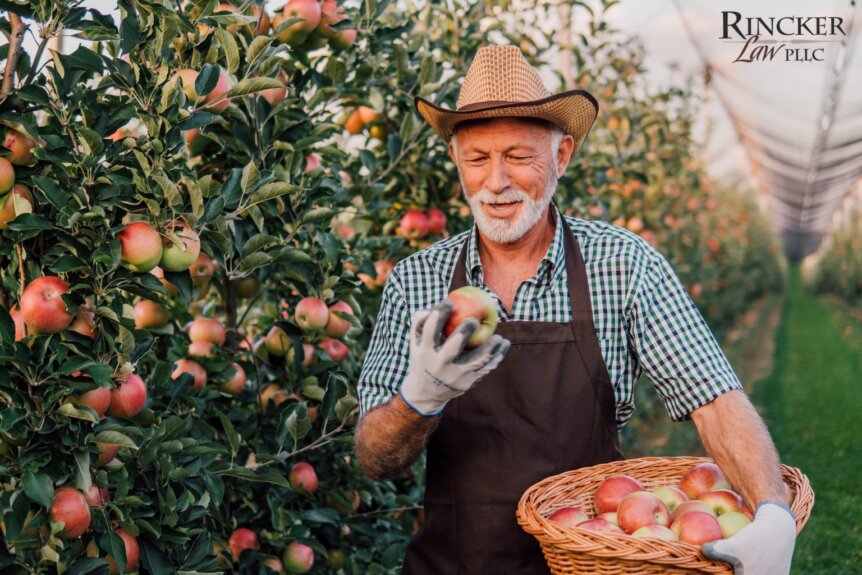For many farms in Illinois, seasonal workers are essential to keeping operations running smoothly during planting, harvesting, and peak production seasons. But hiring help isn’t as simple as shaking hands and getting to work. In this article, Hiring Seasonal Farm Workers in Illinois: What You Need to Know About Ag Labor Laws, we explain the key state and federal rules that apply to agricultural labor so you can avoid costly fines, disputes, and compliance headaches.
Why Seasonal Labor Requires Special Attention
Agricultural work is governed by a unique set of labor laws. While some exemptions apply to farm work, Illinois farmers must still follow strict rules on wages, hours, safety, recordkeeping, and worker classification. Misunderstandings or informal arrangements can lead to penalties, loss of eligibility for certain programs, and damaged business relationships.
Step 1: Understand Employee vs. Independent Contractor Status
One of the most common mistakes farmers make is misclassifying workers.
- Employee: You control when, where, and how the work is done; you provide tools and equipment; and the worker is integrated into your operation.
- Independent Contractor: The worker has control over how they do the job, provides their own tools, and works for multiple clients.
Misclassifying an employee as an independent contractor to avoid payroll taxes or workers’ compensation can result in steep fines from both the IRS and the Illinois Department of Employment Security.
Step 2: Illinois Minimum Wage Rules for Agricultural Workers
As of January 1, 2025, the Illinois minimum wage for agricultural workers is $15.00 per hour for farms that exceed 500 “man-days” of agricultural labor in any calendar quarter of the prior year.
- Small Farm Exemption: Farms with fewer than 500 man-days and immediate family members working on the farm are exempt from the minimum wage requirement.
- Overtime: Agricultural workers are generally exempt from overtime pay under both Illinois and federal law. However, certain activities such as food processing or packaging may not qualify for the exemption and could require overtime pay.
Step 3: Recordkeeping Requirements
Even if your farm qualifies for minimum wage or overtime exemptions, you must comply with Illinois’ recordkeeping laws:
- Maintain detailed records of hours worked, wages paid, pay rates, and deductions.
- Provide pay stubs that reflect hours worked and all deductions taken.
- Keep records for at least three years in case of audits or disputes.
Failing to keep accurate records can result in fines, penalties, and loss of agricultural exemptions.
Step 4: Child Labor Rules in Agriculture
Illinois follows both federal and state child labor standards for agricultural work:
- Under 16: May work outside school hours in non-hazardous farm jobs with parental consent.
- Ages 14–15: Limited permission to operate specific machinery under strict conditions.
- Under 12: May only work on farms owned or operated by their parents.
- Hazardous Tasks: Jobs like handling dangerous chemicals, operating heavy machinery, or working at heights are prohibited for all minors under both state and federal law.
Violations can result in fines and the loss of certain labor law exemptions.
Step 5: Housing and Transportation Rules (MSPA Compliance)
If you provide housing or transportation to seasonal or migrant workers, the Migrant and Seasonal Agricultural Worker Protection Act (MSPA) applies:
- Housing must meet federal and state health and safety standards and pass inspections before occupancy.
- Transportation must be safe, insured, and operated by licensed drivers.
Non-compliance can lead to penalties, lawsuits, and even loss of eligibility to hire seasonal agricultural workers.
Step 6: Paid Leave Requirements
Under Illinois’ Paid Leave for All Workers Act, effective January 1, 2024, most employers, including many farms must provide at least five days (40 hours) of paid leave per year.
- Employers must accurately track leave accrual and usage.
- Some agricultural exemptions may apply, but you should review them carefully with an agricultural or labor law attorney to ensure compliance.
Step 7: Maintain a Safe Workplace
Illinois agricultural employers must also meet OSHA safety standards for farms, including:
- Providing safe drinking water, sanitation facilities, and handwashing stations in the field.
- Training workers on equipment safety and pesticide handling.
- Keeping injury logs and reporting serious workplace injuries.
FAQs: Hiring Seasonal Farm Workers in Illinois
Q: Do I need to pay seasonal workers through payroll?
A: Yes, if they are classified as employees. Even temporary workers must be paid through proper payroll with taxes withheld and pay stubs provided.
Q: Are H-2A visa workers subject to these same rules?
A: H-2A workers have additional federal requirements, including higher minimum wage rates, housing standards, and transportation rules.
Q: Can I pay seasonal workers in cash?
A: Yes, but you must still keep complete wage and hour records, withhold applicable taxes, and provide pay stubs.
Q: What if my farm only hires family members?
A: Immediate family members may be exempt from minimum wage and overtime rules, but safety and child labor laws still apply.
Q: What happens if I don’t comply with these laws?
A: Penalties can include fines, lawsuits, loss of agricultural exemptions, and disqualification from certain federal or state programs.
Need Legal Assistance for Properly Hiring Seasonal Farm Workers in Illinois?
Hiring seasonal farm workers in Illinois can be a win-win by boosting productivity while supporting the agricultural workforce but compliance is critical. Wage laws, child labor rules, recordkeeping requirements, and safety standards all play a role in keeping your farm legally protected.
At Rincker Law PLLC, we help Illinois farmers hire and manage seasonal workers the right way, protecting your operation from costly mistakes and ensuring you keep your agricultural exemptions intact.
Call us today at (217) 774-1373 to discuss your seasonal hiring needs and get compliance-focused legal guidance tailored to your farm.

